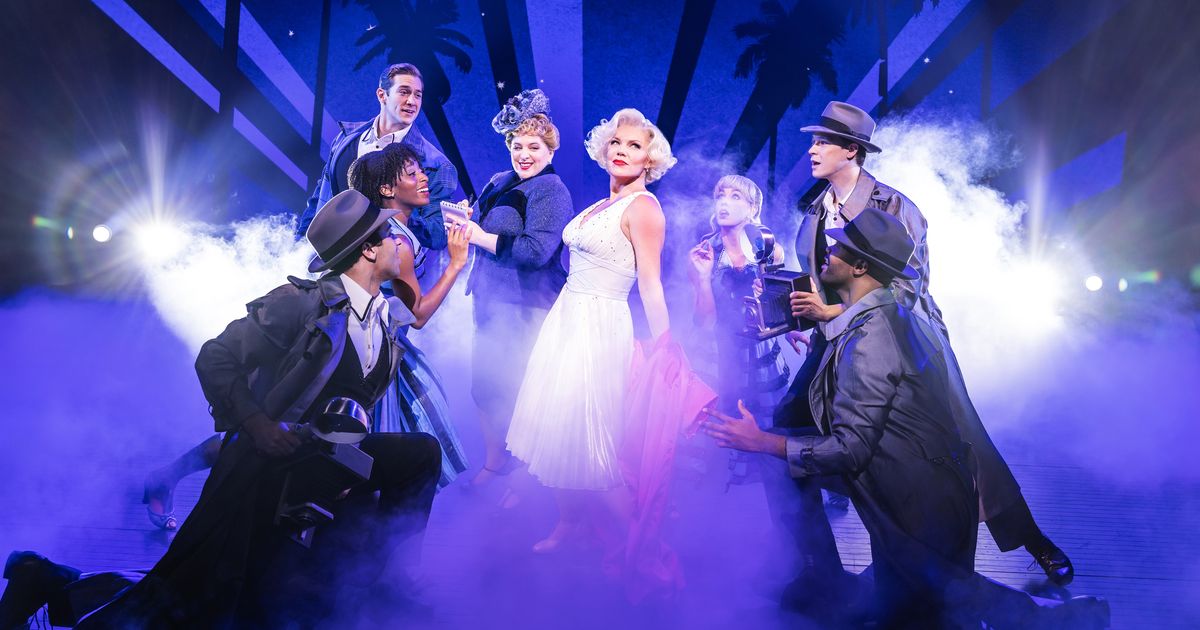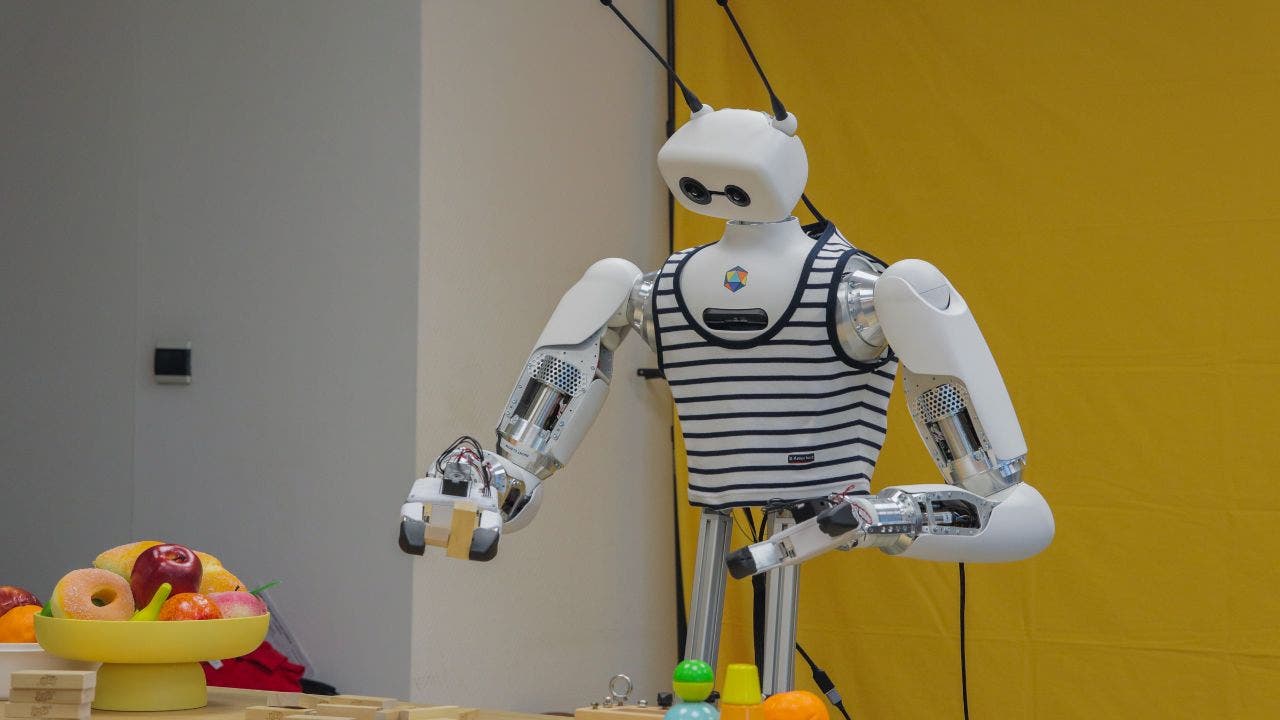From Smash, at the Imperial Theatre.
Photo: Matthew Murphy
The sunk-cost fallacy lies at the heart of producing commercial theater: Sure, you’ve invested way too much time and money and talent in a production that isn’t working, but maybe you can fix it with another workshop? Audiences will finally understand the potential … if the composer just reworks the opening number … if you just replace the director … if you just hire a new writing team … if you just recast the star. That mentality is on full display in the plot of Smash, in which the creative team of a musical tries to right a sinking ship. But it’s much more compellingly on display in the show’s long, storied, and turbulent production history. Once a deliciously hate-watchable prime-time NBC drama with a killer pilot and a steep drop-off in quality, Smash has gone through more than a decade of reworking, including attempts to stage the musical-within-the-show straight-up, and has finally arrived on Broadway overmasticated and gummy. You would think a musical predicated on mess might have a better sense of humor about its own existence.
The producers of this Smash, including former NBC head Bob Greenblatt, Neil Meron, and some musicals fan named Steven Spielberg, seem to be reaching for an audience that didn’t care about the TV show. Billions of those people do exist — Smash wasn’t ever that popular — but given the paragraphs of exposition you have to deliver to explain the backstory, I’m not sure it would ever be possible to win them over. For the uninitiated who have made it this far: The series, the subject of endless fascination on this website, used the production of a troubled musical about Marilyn Monroe, titled Bombshell, as the jumping-off point for a succession of soap-operatic backstage fights, most crucially a rivalry between a talented newcomer named Karen (Katharine McPhee, who always struggled to convey the character’s supposedly innate star quality) and a perpetual chorus girl named Ivy (Megan Hilty, who had too much star quality; she’s having fun on the next block right now). The show’s first season, run by Theresa Rebeck, was chaotic in strange and enthralling ways. Special guest star Uma Thurman got poisoned by a smoothie; we all learned too much about Debra Messing’s adoption process. Its second, helmed by Joshua Safran after Rebeck’s firing, was more competent and less delightfully lurid, and much of it was dedicated to a Rent homage. Smash was never good, but it was always fun. It had insider theater jokes, cameo appearances by Michael Riedel, hideous scarves, and great songs, mostly by the team of Marc Shaiman and Scott Wittman, who return as the sole songwriters this time around.
From the jump, the stage musical, with a book by Bob Martin (spread thin between this and Boop!) and Rick Elice, makes the mistake of trying to button up the madness. Martin and Elice, with director Susan Stroman, have discarded most of the original show’s plot, leaving behind a few similar character names and archetypes. (The songwriter played by Krysta Rodriguez does wear scarves.) We’re still with the team of a Marilyn musical, but now Ivy (Robyn Hurder) is an established Broadway star and Karen (Caroline Bowman) is simply her kindly understudy. The director, Nigel (Brooks Ashmanskas, who moves like a verb in a Jeeves & Wooster novel), is a fey gay man instead of a sleek straight predator, though he still lusts after a member of his ensemble — a dynamic that is, confusingly, played with sympathy for Nigel. The songwriting duo are now a married couple, with Rodriguez (an alumna of Hit List) in the Messing role and John Behlmann as her dopey husband whose main traits are that he drinks a lot and keeps wearing Wisconsin T-shirts (sometimes the university, sometimes just the state). Jacqueline B. Arnold takes over the role of the steely producer, though I’m sorry to report that she throws no martinis in anyone’s face, and Nicholas Matos is her disaffected Gen-Z assistant, who is there only because his father is an investor. That concept sounds funny in theory but leads only to “kids and their phones!” jokes.
The crux of the drama now lies in, of all things, a satire of Method acting: When the songwriters suggest in passing that Ivy might check out a book on the Actors Studio to better understand Marilyn, she becomes obsessed, brings on a Svengali of an acting coach (Kristine Nielsen), starts taking pills, and turns from a reliable pro into a self-absorbed nightmare. The story line may have some grounding in Marilyn’s own reliance on Lee Strasberg’s coaching and the subplot in season one of the show in which Ivy hallucinates on prednisone, but the jokes are easy and get old within the first minute of watching Nielsen mutter in Hurder’s ear. In the right setting, Nielsen is an ace at broad comedy; here, it’s as if someone read a recipe that called for a quarter-teaspoon of nutmeg and then threw in four cups. The whole plotline is frankly cruel and premised around the idea that actors are idiots who shouldn’t be encouraged to think for themselves. “All of this is because of you!” Nigel announces to his songwriters. “You gave her a book!”
That joke might be fine if everyone in Smash were a maniac. The TV show, for all its faults, took equal-opportunity jabs at the self-involvement of theater people, from evil assistants to scheming moneymen and the craven performers in between. Elice and Martin lean on Ivy so hard to provide the drama that the other characters get away with looking relatively sane. Maybe it’s an artifact of the show’s embattled history or the starry production team, but Smash’s gripes are mostly from the side of the people in power: Isn’t it annoying when your employees have opinions? Don’t you wish you could date the hot ones? Why won’t people online just shut up? The last of those becomes bafflingly central to the plot when Bombshell courts the favor of social-media influencers before its first preview in a sequence that closes out Smash’s first act. (I need to know who’s responsible for the production’s horrifically strange memes, which pop up on screens during its Dear Evan Hansen–esque montages of fan reactions.) Hours before that performance, as Ivy has a diva moment and Karen is incapacitated in a reformatting of the series’ poisoning plot line, Bombshell’s assistant director, Chloe (Bella Coppola), suddenly has to step up to play Marilyn, winning the love of the internet. I respect throwing a wrench into the expected battle between Team Karen and Team Ivy, and Coppola has a fantastic, expansive belt. She also has pretty much no characterization to work with. We’re told Chloe gave up a career as a performer because of her body type — “I’m not your typical leading lady,” she says almost as soon as she is introduced — but we never learn much about her beyond her weight and the fact that she’s blandly dutiful. Her becoming a contender for stardom is framed as an empowering twist. When the show’s so uninterested in telling us anything else about her, it’s merely condescending. The attention on Chloe is just another hurdle Bombshell’s creative team stumbles through.
Smash’s moral is, as in many backstage farces, that the madness is worth it because it’s in the service of creating magic. In its musical sequences, the show does achieve flits of greasepaint thrill: Wittman and Shaiman’s songs, mostly big orchestral throwbacks like the great “Let Me Be Your Star,” are still aces. (Though I wish they had kept that number as a duet; we hear it twice, once in incomplete form in a production number and once as a solo. Without the charge that comes from two voices competing for attention over a key change, it never achieves full liftoff.) Joshua Bergasse’s choreography, ported in from his Emmy-winning work on the series, matches those melodies with winking propulsion and wry indulgence — the needless yet sexy shirtless sauna set piece has stuck around. In those sequences, as on TV, Smash transitions into a fantasy of a fully staged version of Bombshell, with Ivy (or Karen or Chloe) in Marilyn regalia as she navigates the studio system, and then back to a rehearsal room with characters in sweats still working through the counts of their dances. Ah, the drama, the laughter, the tears, just like pearls!
I’m a sucker for a self-referential theatrical tale. Give me an All That Jazz or a 42nd Street and I’m happy. But in the version of Smash that made it to the stage, the magic flickers out. You can imagine the characters in a meta-retelling of the show yelling at one another trying to find where they went wrong. It’s not for lack of talent or budget: Stroman did The Producers, Hurder is an incredibly lithe dancer, they clearly spent a ton of money on Beowulf Boritt’s fully realized sets (he uses video screens only when dramatically necessary, bless him), and Alejo Vietti’s costumes have the texture and sparkle of quality material. The ingredients are all there, yet the theatrical bread never rises. Did someone say the name of the Scottish Play backstage? Do good musicals appear only to the pure of heart? Should they have spun around three times, spit on their palms, and flipped a lucky penny into the Andrew Lloyd Webber Memorial Pool?
The answer, in this case, may be that for a musical like this to be good, it has to embrace being ridiculous. Musicals, even great ones, are ridiculous. People spend millions of dollars on concepts like “What if the Founding Fathers rapped?” and sometimes they even make their money back. Smash is tragically afraid of being bad — and worse, it wants to be respectable. Funnily enough, back in Smash’s open workshops last year, the show ended in a major character’s death. That is, to be clear, an insane way to end a musical comedy. It’s also way more compelling than the ending the Smash creative team has put onstage after all the rewrites, one that risks nothing. Though please, everybody, don’t take my note: If you want to succeed in this business, you have to admit to yourself that you’re never going to satisfy everyone — and never read what people write online.
Smash is at the Imperial Theatre.











![‘Matlock’ Burning Questions Answered: What Does the Surprise Pregnancy Mean? Will [Spoiler] Be Outed? (Exclusive)](https://www.usmagazine.com/wp-content/uploads/2025/04/Jason-Ritter-Teases-Bombshell-Matlock-Finale-With-Huge-Cliffhanger-2.jpg?crop=0px%2C0px%2C2000px%2C1051px&resize=1200%2C630&quality=86&strip=all)

